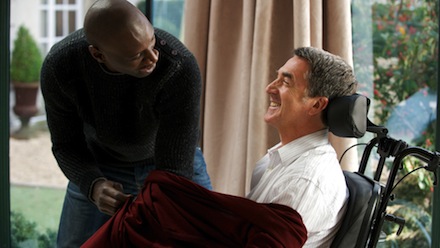I happened to listen to the World Service programme, “Heart and Soul” in the early hours of the morning this last Saturday, on the very topical subject “To Die with Dignity”. The interviewer, John Laurenson, tried to provide balance, as these kinds of programmes always do, by interviewing those on both sides of the debate. Inevitably, certain people, identified as Belgian Catholics (euthanasia is now legal in Belgium), had becomes advocates of euthanasia and saw nothing wrong with it. One person, explaining why it did not contravene the Biblical injunction “Thou shalt not kill”, said it was just like the “coup de grace” on the battlefield; an interesting notion.
But for me the most riveting interviewee came halfway through the programme, when I was drifting back to sleep: a chap called Count Philippe Pozzo di Borgo (from an ancient Corsican aristocratic family, apparently) came on air and raised the debate to a completely different level. He had become tetraplegic in 1993 following a paragliding accident and initially had wanted to kill himself. Somehow he managed to dislodge all the tubes plugged into him, but failed to die. When his wife died of cancer a couple of years later he was again very depressed: “You want to stop living” he said in his heavily-accented English. Had French law allowed euthanasia he would not be here, he admitted.
What had changed his life was his (painfully acquired) new understanding of St Paul’s words, “When I am weak, then I am strong”, which he described as “a lovely message for everyone”. Giving no indication that he was a conventionally religious man – indeed, he stated “You don’t have to be religious to believe what Christ says” – Count Philippe had come to see that Christianity alone paid attention to “the small, the fragile, the weak”. It was through his own weakness that he experienced the revelation that one can live “with great depths and relationships” even if immobile from the neck down.
This seems an almost mystical understanding. After all, it is what characterises the saints – their total self-abandonment to God and trust in him, despite their own weaknesses. For the rest of us, such radical dependency on God is something we struggle with all our life. For the Count, instead of becoming bitter and remaining determined to die, it was a moving and complete reversal of all the values he had lived in his previous 42 years. He told the interviewer that when you are physically helpless “it doesn’t mean everything is wrong” – that’s what comes of believing in “the tyranny of normality and productivity”. Instead, he asserted, “our condition is to be weak, not the other way round.”
In what could be described as a spiritual journey, the Count had come to see that “the place in the shadow of death” where he found himself, was a place “where the light falls most brightly” – the place where the soul lives “even when the brain isn’t functioning”. You could spend years in prayer and spiritual exercises without ever coming to understand Christ’s teaching on self-surrender. Count Pozzo di Borgo, about whose life an award-winning film, Untouchable was made in 2011 (and which I am now keen to see), has come to live it in practice. Needless to say, it was impossible to go back to sleep after listening to this extraordinary man. Talk about triumph of the human spirit: he needs to be wheeled in to the House of Lords the next time the Lords debate another proposed bill by Lord Falconer on euthanasia.
Original Photo by Catholic Herald



